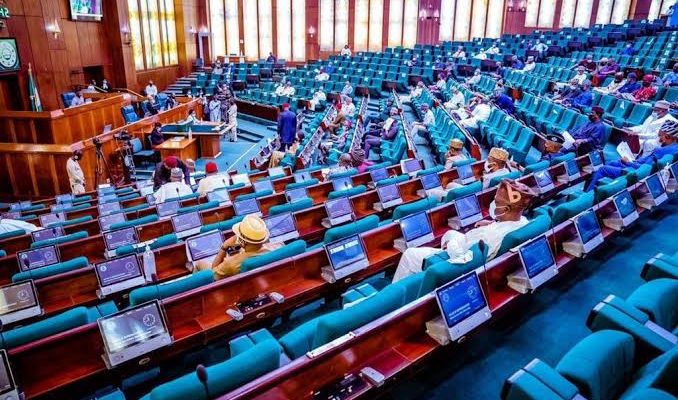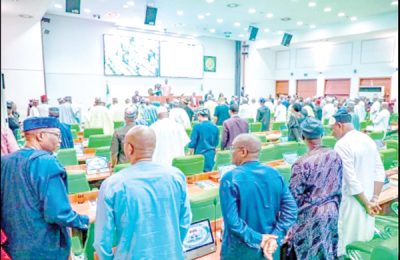

The House of Representatives on Tuesday approved the proposed N26 trillion proposed expenditure and $73.76 oil benchmark for the 2024 fiscal year, as encapsulated in the 2024-2026 Medium Term Expenditure Framework (MTEF) and Fiscal Strategy Paper (FSP).
The resolution was passed sequel to the adoption of the recommendations of the joint Committees on Finance, National Planning and Economic Development and Aid, Loans and Debt Management presented by Hon. James Abiodun Faleke.
After due consideration of the submissions by the Ministries, Departments and Agencies (MDAs), the House adopted the proposed oil benchmark prices of $73.96, $73.76 and $69.90 per barrel for 2024, 2025 and 2026 respectively.

The House also approved daily crude oil production of 1.78mbps, 1.80mbps and 1.81mbps for 2024, 2025 and 2026 respectively subject to Nigerian National Petroleum Corporation Limited (NNPCL) confirmation of actual and verifiable deliveries.
The lawmakers also approved the Exchange Rate of N700, N665.61 and N669.79 to US$1 proposed by the Executive for the periods 2024–2026, with the admonition that Federal Government’s vigorous drive to enhance local production (both oil and non-oil) for increased foreign reserve growth.
The lawmakers also urged Federal Government to ensure that “all items locally produced should be out rightly banned from importation and customs

tariffs amended accordingly.

They also tasked Central Bank of Nigeria (CBN) to ensure that Banks have access to foreign exchange to provide funds to importers and other users to prevent patronage of the parallel market.
In light of the Federal Government’s response of fiscal measures to stimulate the economy through significant investment in infrastructure, SMEs, and the agricultural sector, the lawmakers approved GDP growth rates of 3.76%, 4.22% and 4.78% during the years 2024, 2025, and 2026.
The House also approved the inflation rate of 21.40% in 2024, 20.30% in 2025, and 18.60% in 2026.
While speaking on the synopsis of the report,. Hon. Faleke observed that following the criteria in the overview of the framework for revenues and expenses, which forms the basis of the 2024 Federal Government of Nigeria budget, the proposed spending N26 trillion, of which N16.9 trillion was retained; new borrowings of N7.8 trillion (including borrowing from foreign and domestic); debt service to revenue ratio of 49%; pension, gratuities, and retiree benefits of N1.2 trillion; and a fiscal deficit of N9 trillion (including GOEs).
The projected N16.96 trillion revenues to the Federal Government for the 2024 fiscal year is attainable with effective revenue monitoring exercise and oversight by the relevant Committees of the National Assembly.
According to him, the projected fiscal deficit of N9.048 trillion, N10.02 and N11.48 proposed for the 2024, 2025 and 2026 fiscal years are 22%, 13.6% and 1% lower than the N11.6 trillion fiscal deficit for the year 2023.
The proposed strategy for the government in 2024 towards deficit financing is to increase funding from privatization proceeds and foreign borrowing and reduce funding from multilateral and bilateral project-tied loans, and domestic borrowing.
He also noted that the Federal Government’s commitment to progressively restructure its debt portfolio towards achieving a balanced domestic-to-external debt ratio is evident in the 2024-2026 MTEF and FSP.
He lamented that a significant number of the Federal Government’s Revenue-Generating Agencies engaged in arbitrary, frivolous and extra-budgetary expenditure.
Hon. Faleke further observed that most of the Revenue Agencies violate the Fiscal Responsibility Act of 2007 due to the lack of punitive provisions in the Act.
While noting that most agencies are not complying with financial reporting standards, Hon. Faleke averred that some Revenue Generating Agencies were involved in Joint venture agreements, especially in the oil and gas sector where Forward Sales Agreements are executed for upfront payments for future product delivery without recourse to the National Assembly.
“This trend was also observed in other sectors notably in the power sector where power purchase agreements were entered into by NBET and NDPHC committing the Federal Government to a whopping $40 million monthly Take Or Pay agreement even when the agencies were fully aware that the country has limitations in meeting up with the obligation of the agreements.”
According to him, such agreements subject the country to International arbitrations which expose the country to huge contingent liabilities; in 2024 alone, contingent liabilities of the government are estimated at N6.9 trillion, and N7 trillion for 2025 and 2026 respectively.
While speaking on the table of contingent liabilities, the lawmakers observed that the above contingent liabilities are a result of various agreements signed on behalf of the Federal Government of Nigeria by various GOEs/MDAs and some states but guaranteed by the Federal
Government of Nigeria, however, it was observed that most of these agreements were never brought to the National Assembly for consideration, hence these agreements were domiciled and subject to international Laws or legal systems.
The lawmakers observed that many agencies, particularly those in charge of collecting stamp duties, do not use information and communication technology (ICT) effectively for revenue collection.
The Committee also decried that the subsidiaries of NIPOST Properties Limited and NIPOST Transport and Logistics Limited were created out of NIPOST with individuals as shareholders without any share allotted to NIPOST as an entity.
He observed that the sum of N10 billion was released from the Ministry of Finance for the restructuring and recapitalization in 2022 without corresponding result.
The House also noted that despite the deficit budget, the proposed tax waivers to be granted in 2024 are N 2.7 trillion, 2025 is N3.2 trillion and 2026 is N3.8 trillion. These constitute 30% of the total fiscal deficit for 2024, 31% for 2025 and 32% for 2026.









